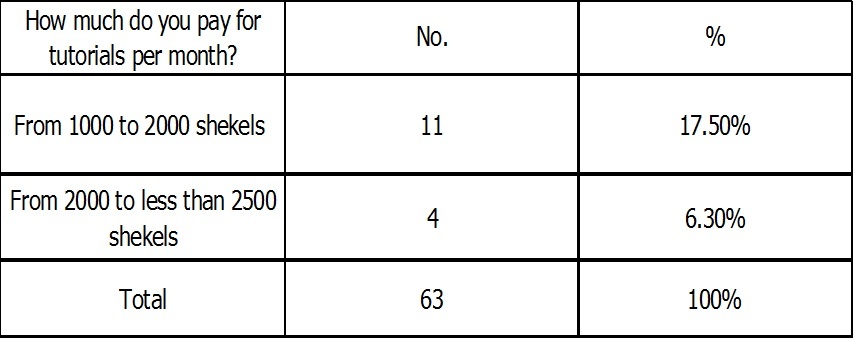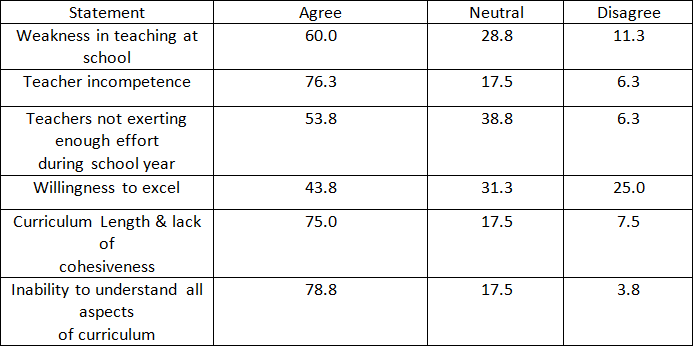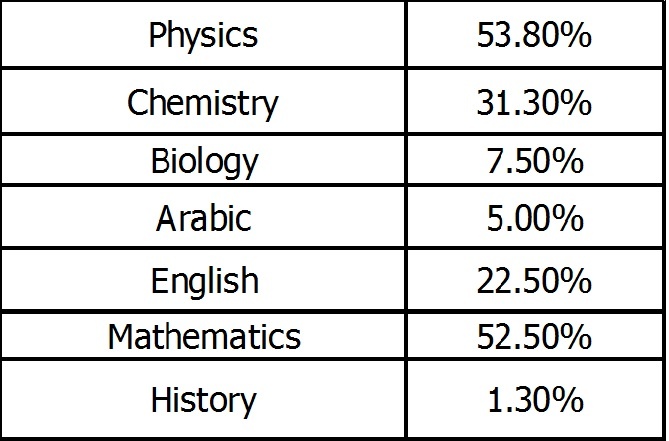Gaza City (Al Hayat Al Jadeeda Newspaper) – Despite her happiness at passing her examinations with an average of 97.2%, high school student Doa’a Zuhair Quweider appears worried because of the private lessons that she needed to take.
The cost of the lessons took a huge toll on her father and his family; he spent half his 2000 shekels salary on extra lessons which were necessary because of the difficulty and length of the curriculum, and the lack of effort exerted by the teachers who worked unmonitored.
Quweider, who was studying humanities at school, lives in a modest house in Daraj district. It consists of three rooms with an estimated area of 90 square metres and is home to the eight-member family. The father’s meagre salary supports them all and is considered below the poverty line, which the Palestinian Statistics Centre calculates at 2,293 Israeli shekels for a family of five. The abject poverty line is 1,832 shekels ($520 dollars).
While the well-wishers pass by to congratulate her, a tearful Quweider recounts how her father spent 1000 shekels per month (approximately 300 dollars) on private lessons in three subjects: Arabic, English and mathematics.
The three reporters conducted a survey of 80 high school students with above 90% averages. It showed that 76.2% of the high achievers from several Gazan schools spent at least 1000 shekels ($300) a month on private tutorials, whereas 17.5% spent between 1000 and 2000 shekels. This is clarified in the following table:

Doa’a’s father Zuhair says: “I had to cut down on our home spending in order to put aside the cost of the private lessons so that Doa’a can achieve a grade that would get her a scholarship for university.”
Despite the fact that civil service law in the Palestinian Authority forbids the governmental employee from holding two jobs, the Ministry of Education has not banned private lessons. Instead, it allowed 60 educational centres to open in Gaza and the North in 2010, with support from UNICEF. These centres offer lessons at a price of 20 shekels per month for each subject.
Mahmoud Mattar, director of the West Gaza Education Department, says “these centres, which cost the ministry nearly 70,000 shekels during the 2010/2011 school year, were launched to to limit private lessons given by teachers after school hours. This, however, has failed. The number of centres were reduced to 25 this year.”
According to Marwan Sharaf, Head of Examinations Committee, these centres failed because students believed that teachers were not exerting all efforts to help students.
There are dozens of unlicensed private centres offering private tutorials, in addition to those being given at home.
Because he was unable to take private lessons, high school student Hamza Al Mashharawi did not pass his exams in Business Administration and Economics in the first round of examinations. But he succeeded in Arabic and English, subjects he got private tutorials in.
He says: “my father’s inability to pay the 50 to 60 shekels for the private lessons ended up in my being able to take lessons in only two subjects and led to my failing in Business Administration and Economics.
It was a similar story for Ghadeer Mohammad; her family’s bad economic situation did not permit her to take any private lessons. She failed in geography and law. When she retook the exams her average was a dismal 64.5% – disqualifying her for admission to the Faculty of Law.
“If it weren’t for private lessons I would have never passed.” This is how Mu’awiya Al Khazandar describes his passing the high school exam with an average of 93.1%.
For a whole year, his family of five endured hardships in order to save enough money from his father Seifedeen Al Khazandar’s measly retirement pension of 1800 shekels ($500). Half of this amount was spent on tutorials in three subjects: maths, chemistry and physics.
The minute he heard the news, the eyes of his 64-year-old father welled up with tears of joy; the memories of what he had endured for a year and his having to borrow money all disappeared.
The survey of 80 high school students also found out that 65% of them agreed that private lessons were important to secure a high passing grade.

Parents have become burdened between the obligation of providing for their families and granting their children’s wishes for private lessons. Majed Quweider says: “I rejected the idea of private tutorials. But when my daughter kept complaining about her teacher’s ineptitude in explaining course material, I went to the headmistress, to no avail. I finally agreed to provide the money for private lessons”.
Both Islam Ismael and Muna Ismael did not wait until the end of the school year; they started taking private lessons in physics in August 2013. They couldn’t understand the material and their teacher was incompetent. As for Mustapha Dohan, who was in the humanities stream, he began taking tutorials in five subjects from the beginning of the year.
Palestinian historian Salim Al Mubayed says, “with their families’ encouragement, the youth have turned to education due to a lack in job opportunities. Parents regard this as an investment in their children’s future”.
Professor Emad Kashko says the lack of teacher training and inexperience in passing on information are two of the main causes that lead students to take private lessons. Assistant deputy minister Dr. Ziad Thabet says many teachers rely on traditional methods when delivering a lesson.
In the study carried out, results showed that some of the main causes were the length of the school curriculum and its lack of cohesiveness followed by teacher’s incompetence in the delivery of course material. This is evident in the following table:

Reasons for Taking Private Lessons
The number of high school teachers in the Gaza Strip is 3440 out of 4698 teachers working in 145 high schools: 400 teachers hold a Master’s degree and the rest have a higher diploma or a Bachelor’s.
The annual review report for the years from 2008 to 2012 showed a drastic decline in the surveyed teachers’ critical thinking skills. Furthermore, life skills reviewed in text- books were incomplete, unorganized and random. The study called for the inclusion of life skills and the improvement of teachers’ skills and their evaluation abilities.
A study entitled ‘Training of incumbent high school teachers in the Gaza Strip,’ published in the second edition of the 18th volume of the Islamic University Magazine, described the training as “weak.”
The crisis of teacher incompetence goes back to the start of the Palestinian division in 2007, when the Palestinian Authority asked its employees in Gaza to walk off the job as a show of civil disobedience, to reject Hamas’ hold on the Strip.
As a result the Gazan government started hiring unqualified teachers to fill the gap in schools. Department of Planning director Dr. Ali Khaliefa says, “these hirings had a negative effect on the calibre of teachers being taken on for the job of teaching high school as there were no qualified candidates.”
The number of employees who are on strike in the Ministry of Education is 3300 of which 1836 are teachers. According to the ministry’s 2013 statistics around 300 went back to work.
Dr. Khaliefa says that despite the fact that the Ministry of Education passed a resolution in the 2011/2012 academic year restricting private lessons and punishing teachers who gave them, this decision was rescinded in the same year due to pressure from the teachers who did not take the issue seriously.
Mahmoud Mattar, director of the West Gaza Education Department says “the restriction order listed a number of procedures including the transferring of the teacher to a village school, removal of benefits such as transport and raises, and finally dismissal.” He confirms that low income usually leads teachers to giving private lessons.
Teacher salaries range from 1400 to 3600 shekels ($400 to $1000) and they differ between Gaza and the West Bank. According to the Department of Planning, in Gaza, the starting salary for a teacher with a BA degree is 1800 shekels ($500) reaching up to 3600 shekels after 35 years. The same graduate would receive 2400 shekels in the West Bank and around 4000 shekels by retirement age.
According to the Palestinian Statistics Centre, the salaries of teachers are close to the abject poverty line of 1,832 shekels ($520) and the one income, five-member family poverty line of 2,293 shekels.
The 2013 Ministry of Education in the West Bank budget was 2.1 billion shekels (approximately $620 million) most of which was allocated to salaries. As to the ministry’s budget in Gaza it reached $80 million, which also went on salaries. That is a total of 800 million dollars spent on the education sector in Palestine which constitutes no more than 15% of both budgets. In contrast, the security sector takes one third of the budget of both areas with more than $4.5 billion.
Professor of Economics in Al Azhar University, Dr. Mo’een Rajab confirms that the Ministry of Education budget is considered low considering the number of employees. This, he said, is due to the lower salary scale that the ministry has in comparison with the security sector and other ministries.
The Ministry of Education employs 55950 persons with 37250 in the West Bank and 18700 in the Gaza Strip.
The education sector in Gaza is not free of favouritism and preferential treatment. An unnamed official confirms that some schools benefit from receiving better- qualified teachers assigned by the ministry.
These schools are: Arafat school for excelling students, Palestine, Basheer, Al Rayes, Al Qahira, Amir Al Mansi, Al Karmel, Khalil Al Wazir, Ramzi Fakher, and Zahrat Al Mada’en. This is refuted by Assistant Deputy Minister D. Ziad Thabet who says, “the distribution process is carried out according to specialization and place of domicile.
The difficulty of examination is one of the main reasons that students turn towards private lessons, as is confirmed by high school student Yasmeen Hamad’s comment “the 2013 exams were hard.”
A study entitled ‘the difficulty of high school examination in Gaza governorates and how to overcome this,’ was carried out by head of the teachers’ union professor Sam’an Atallah in 2012. It proved that the difficulty of the exam questions, which were often set at the whim of the examiner without adhering to guidelines, pushed students towards tutorials and private lessons as well as condensed textbooks. He also says that the set problems usually require answers that are understood and memorized with not enough analytical questions.
When comparing a number of high school subjects in several Arab states, it becomes evident that the Palestinian curriculum, despite having eliminated one subject, is still considered one of the largest and lengthiest. The number of subjects in the Humanities stream is nine and eight in the Science Stream, not taking into account that some subjects are covered in two textbooks. In Egypt, however, according to the Ministry of Education website, there are six subjects in each stream with three combined subjects which include two languages. The remaining three are dependant upon the stream the student is in. Director of the Curricula board, Dr. Jihad Zakarneh also confirms that in Tunis and Kuwait, the subjects range between five and seven in number.
The obvious increase in private lessons started when the new Palestinian curriculum went into effect in the West Banka and the Gaza Strip in 2002. Prior to that the Gaza Strip had implemented the Egyptian curriculum while the West Bank taught the Jordanian curriculum
A number of the high school students who were surveyed by the reporters confirmed that the Palestinian curriculum was too big and “confusing,” which is why they resorted to taking private lessons.
Several teachers who were also surveyed agreed with the students’ assessment. Professor Hanem AnNakhala says: “the lessons do not provide enough time to explain the curriculum.” Professor Salim Al Ramlawi adds: “some teachers are under pressure to finish the curriculum because of being supervised.” Anas Ismael interjects “it is us students who end up on the losing end, with large classes of up to 50 students each term…which makes us turn to private lessons.”
The survey carried out by the reporters showed that students concentrated on private lessons in physics, mathematics, chemistry, and English.

Director of the Department of Planning at the Ministry, Dr. Ali Khaliefa agrees with the results of the study saying “ the length of the curriculum and the difficulty of the scientific data make the students turn to private lessons.”
A study carried out by the Examinations and Follow-up Department at the Ministry of Education in Gaza Strip, in 2012 indicated that 81% of the science lesson was dedicated to theory and 40% of the experiments listed in the text remain untested.
Assistant deputy minister Dr. Ziad Thabet agrees that the curriculum needs to be evaluated and amended and teaching methods updated.
Director of Curricula and Supervision in the outgoing government, Dr. Fathi Kaloub says, to overcome the curriculum problems, the Ministry of Education started decreasing the number of subjects which students have to take in September 2013. The division had an impact on this decision; the ministry in Gaza implemented this by removing Information Technology from the curriculum, whereas in the West Bank it became an audit subject without examination. The two ministries agreed to remove Business Administration and Economics from the Science Stream, General Information from the Humanities Stream and Current Cases from the Law Stream.
Director of the Curricula Board, Dr. Jihad Zakarneh says, “the reduction in the number of subjects was the first stage in the high school examinations’ improvement plan and aimed at reducing the hardship on students, who have to study ten subjects.”
He explains that next year should witness the birth of a new system that will include revised curricula.
And until we have a new system that will bring an end to corruption and tutorials, and the delivery of a new Palestinian curriculum more suited to the capabilities of teachers and students, as well as an increase in salaries, high school students will continue to pay for private lessons from their parents incomes!!
This investigative report was completed with the support of Arab Reporters for Investigative Journalism (ARIJ).
The Palestinian Territories have one of the lowest illiteracy rates in the world. According to the Palestinian Statistics Centre and UNESCO, in 2012, the illiteracy rate for those 15 years and over was 4.1%. As for Unemployment figures, they reached 32.2% among youths in the Gaza Strip. Poverty according to consumption was a rate of 25.8% (actual 17.8% in the West Bank and 38.8% in the Gaza Strip). 21.1% of the population of the Gaza Strip are under the abject poverty line. For the year 2013, there were 86800 high school students in the Palestinian Territories. 6778 of them were studying Sciences in Gaza and 10242 in the West Bank. As for Humanities, the number in Gaza was 30812 and 33967 in the West Bank. According to the Ministry of Education, the pass rate for 2013 in Gaza was 63.76% divided as follows: Humanities 58.8% and Sciences 86.7%. This was close to the 2012 pass rate, which was 64.7%.
High School Subjects and number of pages per book
Science Stream: Nine Subjects (prior to reduction): Arabic with two textbooks, the first literature, narrative and criticism (131 pages) and the second grammar (122 pages), Islamic Religion (167 pages), English Language with two texts the first a practice book (98 pages) and the second a student book (192 pages), Physics (203 pages), Chemistry (219 pages), Biology (170 pages), Mathematics with two texts the first Calculus (162 pages), and the second Integral Calculus and Charts (104 pages), Business Administration and Economics (143 pages) and Technology (115 pages).
Humanities Stream: Ten subjects (prior to reduction): Arabic with two textbooks, the first literature, narrative and criticism (131 pages) and the second grammar (122 pages), Islamic Religion (167 pages), English Language with two texts the first a practice book (98 pages) and the second a student book (192 pages), Business Administration and Economics (142 pages), Mathematics (123 pages), Technology (115 pages), General Information (125 pages), Current Cases (96 pages), History (131 pages) and Geography (171 pages).








Leave a Reply